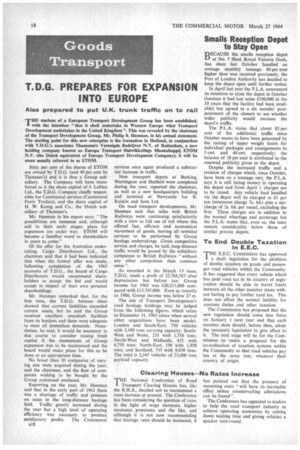T.D.G. PREPARES FOR EXPANSION INTO EUROPE
Page 20

If you've noticed an error in this article please click here to report it so we can fix it.
Also prepared to put U.K. trunk traffic on to rail
THE nucleus of a European Transport Development Group has been established, with the intention "that it shall undertake in Western Europe what Transport Development undertakes in the United Kingdom ". This was revealed by the chairman of the Transport Development Group, Mr. Philip S. Henman, in his annual statement. The starting point for this new enterprise is the formation in Holland, in conjunction with T.D.G.'s associates Thomsens's Verenigde Redrijven N.V. of Rotterdam, a new holding company known as Europa Transport Ontwikkelings Maatscbappij ETOM N.V. (the Dutch equivalent of Europa Transport Development Company); it will be more usually referred to as ETOM.
Sixty per cent of the shares of ETOM are owned by T.D.G. (and 40 per cent by Thomsen's) and it is thus a Group subsidiary. The Company will have transferred to it the share capital of I. Leftley Ltd., the T.D.G. Company chiefly responsible for Continental services (Continental Ferry Trailers). and the share capital of H. W. Konig and Co., the Dutch subsidiary of Thomsen's.
Mr. Heilman in his report says: The possibilities are immense and, although still in their early stages, plans for expansion are under way. ETOM will become a familiar word to shareholders in years to come."
Of the offer for the Australian undertaking, Cargo Distributors Ltd., the chairman said that it had been indicated that when the formal offer was made, following completion of the 1963 accounts of T.D.G.. the board of Cargo Distributors would recommend shareholders to accept the bid and would accept in respect of their own personal shareholdings.
Mr. Henman remarked that, for the first time, the T.D.G. balance sheet showed that current liabilities exceeded current assets, but he said the Group received excellent overdraft facilities from its bankers and these were adequate to meet all immediate demands. Nonetheless, he said, it would be necessary in due course to consider raising fresh capital if the momentum of Group expansion was to be maintained and the board would make plans for this to be done at an appropriate time.
No fewer than 30 companies of varying size were acquired during the year, said the chairman, and the flow of companies wishing to be bought by the Group continued unabated.
Reporting on the year, Mr. Henman said that in the early part of 1963 there was a shortage of traffic and pressure on rates in the long-distance haulage field. Traffic greatly increased during the year but a high level of operating efficiency was necessary to produce satisfactory profits. The Continental P.18 services once again produced a substantial increase in traffic.
New transport depots at Barking. Warrington and Hatfield were completed during the year, reported the chairman, as well as a new headquarters building and terminal at Newcastle for R. Rankin and Sons Ltd.
On road transport developments. Mr. Henman said that talks with British Railways were continuing satisfactorily with a view to full use of rail where this offered fast, efficient and economical movement of goods, leaving all terminal services to be performed by -Group haulage undertakings. Given competitive service and charges, he said, long-distance traffic would be passed by the subsidiary companies to British Railways "without any other compulsion than common sense ".
As recorded in the March 13 issue, T.D.G. made a profit of £2,768,567 after depreciation but before tax; Group income for 1963 was £20,211,000 compared with £15,747,000. Even as recently as 1960, Group income was below £7 m.
The size of Transport Development's road haulage holdings may be judged from the following figures, which relate to December 31, 1963 (since when several other acquisitions have been made). London and South-East, 750 vehicles with 5,100 tons carrying capacity; SouthWest and Wales, 235 with 1,750 tons; North-West and Midlands, 435 with 4,750 tons; North-East, 190 with 1,950 tons; and Scotland, 735 with 9,650 tons. The total is 2,345 vehicles of 23,000 tons payload capacity.




































































































